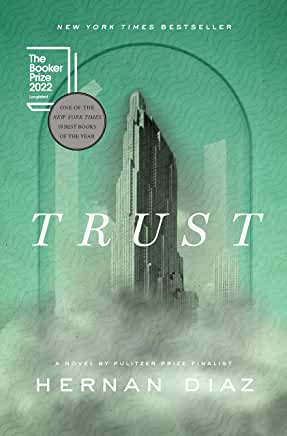Books |
Trust
Hernan Diaz
By
Published: Apr 23, 2023
Category:
Fiction
I prefer to read short novels. I write short novels. “Trust” is 402 pages. I read it twice.
The first time, because it’s just so well written, I couldn’t put it down. The second time, because I knew what the surprises were, I read it to try to figure out how Hernan Diaz did it.
I’m not on a personal crusade. “Trust,” the best novel I’ve read this year, is also the best for many others: It just won the Pulitzer Prize. It’s one of The New York Times and Washington Post top ten books of 2022. It’s longlisted for the 2022 Booker Prize. HBO is developing it as a streaming series. [To read an excerpt, click here and here and here. To buy the book from Amazon, click here. For the Kindle edition, click here.]
Trust” has four sections, each by a different “author,” each telling the story from a different point-of-view, each presenting different “facts.”
The first purports to be a novel about Benjamin Rask. It’s called “Bonds,” it’s by “Harold Vanner,”and it was a bestseller in 1937. It has no dialogue, it reads like acutely reported journalism. It begins with this: “Because he had enjoyed almost every advantage since birth, one of the few privileges denied to Benjamin Rask was that of a heroic rise.” As one of the world’s wealthiest investors in the 1920s and 1930s, Rask gets more attention than his reclusive wife Helen. Not that he wants it. He builds a big house and gives no parties, joins clubs he never visits. “He became a wealthy man playing the part of a wealthy man.” Luxury is, for him, “a vulgar burden.” His interest is capital, “an antiseptically living thing.” He likes it because it “moves, eats, grows, breeds, falls ill, and may die.” Above all, “it is clean.”
As a child, Helen had remarkable gifts. She could memorize passages from books in different languages and repeat them as after-dinner entertainment. This talent became useful when her father became mentally incapacitated, and she and her mother were itinerant houseguests. Her mother brokered the marriage with Benjamin Rask. Helen went along with it because “she saw he was, in essence, alone. In his vast solitude, she would find hers.” He declared only one room in their home off-limits: his office, empty except for a chair and a stock ticker. Helen astutely realizes that “privacy requires a public façade” and developed an interest in cultural patronage, specifically in funding living authors and the treatment of psychiatric illnesses.
Rask makes a second fortune after the 1929 crash. He’s not beloved for that. He’s not apologetic: “The crash, he believed, had been a lancet applied to an abscess. A good bleeding was necessary to do away with the swelling so that the market could find its true bottom and rebuild on solid foundations.”
At home, there’s a personal crash: Helen deteriorates, barely sleeping. She’s “unable to stop thinking about her thoughts.” She fills journals and hides them. She’s institutionalized in Switzerland. The therapy is brutal. She becomes “a breathing carcass.” She dies.
Book 2, entitled “My Life,” is written by “Andrew Bevell,” a stand-in for Rask. Written in 1938, it is his response to Vanner’s bestseller, which he must destroy. In it, he presents himself as a practical philosopher: “Business is the common denominator of all activities and enterprises… The businessman is the true Renaissance man.” He misses his wife: “She saved me.”
Book 3, “A Memoir, Remembered,” is by “Ida Partenza,” a poor young woman Bevell hires. He feels the weight of time and wants to dictate his memoirs. Specifically, he wants to explain his legendary string of triumphs and to establish his wife as the champion of traditional culture. Ida discovers Helen’s diary. The musicians she supported? Cutting-edge. The writers? Iconoclasts. She steals it. And then Bevell dies. What will she do with what she’s learned?
And now we come to the final section, “Futures.” It’s 40 pages of notes written by “Mildred Bevell” when she was in the Swiss sanitarium. I can’t write about it without spoilers. Let’s just say that a large surprise awaits you and will force you to ask basic questions, especially this: who do you trust?
I can share something interesting. I asked a friend who knows Hernan Diaz how he kept the plot straight. How did he know when to detonate the questions of fact — and the surprises at the end? She smiled at his strategy: “He wrote sections three and four first.” Ah, so he always knew where he was going. And, yes, behind every fortune is a crime.


